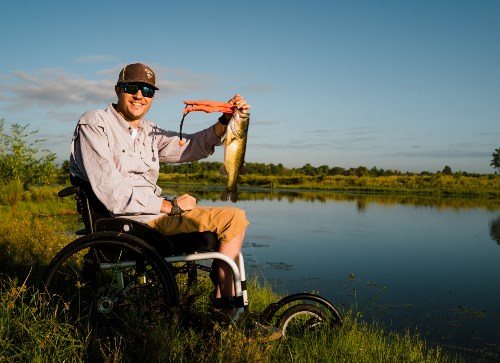The National Institute on Disability, Independent Living and Rehabilitation Research (NIDILRR) has announced funding awards to TIRR Memorial Hermann as a Traumatic Brain Injury Model System (TBIMS) and Spinal Cord Injury Model System (SCIMS). NIDILRR awards grants to institutions that are national leaders in medical research and patient care. As part of the institute’s Model Systems of Care, participating organizations contribute to the Traumatic Brain Injury (TBI) and Spinal Cord Injury (SCI) National Data and Statistical Center and conduct independent and collaborative research studies. TIRR Memorial Hermann is the only site in Texas and one of only six sites nationwide to have both TBI and SCI Model Systems programs.
The Traumatic Brain Injury Model System
 The NIDILRR TBI Model Systems program began in 1987 and is one of the largest research programs on recovery from TBI in the world, with the largest longitudinal database on traumatic brain injury. The Brain Injury Research Center (BIRC) at TIRR Memorial Hermann, led by director Angelle Sander, PhD, professor in the Baylor College of Medicine’s H. Ben Taub Department of Physical Medicine and Rehabilitation, was one of the original TBI Model Systems sites. The TBI Model System program now consists of 16 centers around the United States.
The NIDILRR TBI Model Systems program began in 1987 and is one of the largest research programs on recovery from TBI in the world, with the largest longitudinal database on traumatic brain injury. The Brain Injury Research Center (BIRC) at TIRR Memorial Hermann, led by director Angelle Sander, PhD, professor in the Baylor College of Medicine’s H. Ben Taub Department of Physical Medicine and Rehabilitation, was one of the original TBI Model Systems sites. The TBI Model System program now consists of 16 centers around the United States.
TIRR Memorial Hermann has been funded as a TBI Model System center for six five-year cycles, with the most recent cycle beginning in September 2022 and running through August 2027. The new TIRR Memorial Hermann / Baylor College of Medicine / UTHealth Houston Collaborative TBI Model System will enroll individuals with TBI in a national database, for a multicenter, longitudinal study that examines the course of recovery and outcomes following the delivery of a coordinated system of acute neurotrauma care and inpatient rehabilitation. The database collects information on the course of TBI through the continuum of care, including acute trauma care, comprehensive inpatient rehabilitation, post-acute rehabilitation and long-term outcomes.
 Dr. Sander is TBIMS project director, and Shannon Juengst, PhD, CRC, who joined the Brain Injury Research Center in September 2021 as senior scientist at TIRR Memorial Hermann and clinical investigator for BIRC, is co-director of the TBIMS. Monique Pappadis, PhD, is director of dissemination and cultural humility, and Cindy Ivanhoe, MD, professor of physical medicine and rehabilitation at McGovern Medical School at UTHealth Houston, is medical director.
Dr. Sander is TBIMS project director, and Shannon Juengst, PhD, CRC, who joined the Brain Injury Research Center in September 2021 as senior scientist at TIRR Memorial Hermann and clinical investigator for BIRC, is co-director of the TBIMS. Monique Pappadis, PhD, is director of dissemination and cultural humility, and Cindy Ivanhoe, MD, professor of physical medicine and rehabilitation at McGovern Medical School at UTHealth Houston, is medical director.
 In addition to the overall TBIMS project, TIRR Memorial Hermann is conducting a local research project led by Dr. Juengst, called “Symptom Trajectories and Evolution of Mental Health Conditions Over the First Year Post-Injury: A Mobile Health Application.” The study will track temporal patterns of everyday neurobehavioral symptoms—emotions, fatigue, cognitive challenges and substance use—that often develop into mental health conditions in the first year after TBI, and determine patterns in these symptoms that predict a diagnosis of depression or anxiety at one year post-injury. Tracking is conducted via a mobile health platform developed specifically with and for persons with TBI, allowing for the collection of data on emotional and behavioral symptoms in daily life.
In addition to the overall TBIMS project, TIRR Memorial Hermann is conducting a local research project led by Dr. Juengst, called “Symptom Trajectories and Evolution of Mental Health Conditions Over the First Year Post-Injury: A Mobile Health Application.” The study will track temporal patterns of everyday neurobehavioral symptoms—emotions, fatigue, cognitive challenges and substance use—that often develop into mental health conditions in the first year after TBI, and determine patterns in these symptoms that predict a diagnosis of depression or anxiety at one year post-injury. Tracking is conducted via a mobile health platform developed specifically with and for persons with TBI, allowing for the collection of data on emotional and behavioral symptoms in daily life.
 The TBIMS’s collaborative module project, “Multidimensional Health Perceptions Profiles for Personalizing Patient-Provider Communication,” also will be led by Dr. Juengst and will validate a measure of health perceptions for persons with TBI: the Multidimensional Health Perceptions Questionnaire. Developed and validated in a general population, with both English and Spanish speakers, using patient-centered outcomes techniques, it captures several areas considered to be important social determinants of health, including anticipated discrimination, spiritual health beliefs, beliefs about social and emotional well-being, trust in health care providers, health self-efficacy and perceived health literacy.
The TBIMS’s collaborative module project, “Multidimensional Health Perceptions Profiles for Personalizing Patient-Provider Communication,” also will be led by Dr. Juengst and will validate a measure of health perceptions for persons with TBI: the Multidimensional Health Perceptions Questionnaire. Developed and validated in a general population, with both English and Spanish speakers, using patient-centered outcomes techniques, it captures several areas considered to be important social determinants of health, including anticipated discrimination, spiritual health beliefs, beliefs about social and emotional well-being, trust in health care providers, health self-efficacy and perceived health literacy.
The Texas Model Spinal Cord Injury System
 The NIDILRR SCI Model Systems (SCIMS) Program began in 1970 to support research and the provision of comprehensive medical rehabilitation services for individuals with spinal cord injury. In 2022, TIRR Memorial Hermann’s center for Spinal Cord Injury and Disability Research (SCIDR) was awarded the Texas Model Spinal Cord Injury System (TMSCIS) and rejoined 18 SCIMS centers across the United States as they mark the milestone of 50 years of working to improve the lives of individuals with SCI.
The NIDILRR SCI Model Systems (SCIMS) Program began in 1970 to support research and the provision of comprehensive medical rehabilitation services for individuals with spinal cord injury. In 2022, TIRR Memorial Hermann’s center for Spinal Cord Injury and Disability Research (SCIDR) was awarded the Texas Model Spinal Cord Injury System (TMSCIS) and rejoined 18 SCIMS centers across the United States as they mark the milestone of 50 years of working to improve the lives of individuals with SCI.
 The TMSCIS is a collaboration among TIRR Memorial Hermann, Baylor College of Medicine, UTHealth Houston and the University of Montana. The TMSCIS will enroll individuals with SCI in a national database, conducting a longitudinal study that follows individuals with SCI through their acute care trauma, rehabilitation and long-term outcomes over their life span; conduct a site-specific project; and collaborate in module projects with other Model Systems centers.
The TMSCIS is a collaboration among TIRR Memorial Hermann, Baylor College of Medicine, UTHealth Houston and the University of Montana. The TMSCIS will enroll individuals with SCI in a national database, conducting a longitudinal study that follows individuals with SCI through their acute care trauma, rehabilitation and long-term outcomes over their life span; conduct a site-specific project; and collaborate in module projects with other Model Systems centers.
 TMSCIS project director is Heather Taylor, PhD, associate professor of physical medicine and rehabilitation at UTHealth Houston, senior scientist and director of SCIDR at TIRR Memorial Hermann and an adjunct associate professor in Baylor College of Medicine’s H. Ben Taub Department of Physical Medicine and Rehabilitation. Co-investigators include Susan Robinson-Whelen, PhD, scientist at TIRR Memorial Hermann, clinical investigator at SCIDR, assistant professor of physical medicine and rehabilitation at Baylor College of Medicine and assistant professor at UTHealth Houston; Argyrios Stampas, MD, director of spinal cord injury medicine research at TIRR Memorial Hermann and associate professor at UTHealth Houston; and Rosemary Hughes, PhD, senior research scientist at the University of Montana’s Rural Institute for Inclusive Communities and a research professor in the university’s Department of Psychology.
TMSCIS project director is Heather Taylor, PhD, associate professor of physical medicine and rehabilitation at UTHealth Houston, senior scientist and director of SCIDR at TIRR Memorial Hermann and an adjunct associate professor in Baylor College of Medicine’s H. Ben Taub Department of Physical Medicine and Rehabilitation. Co-investigators include Susan Robinson-Whelen, PhD, scientist at TIRR Memorial Hermann, clinical investigator at SCIDR, assistant professor of physical medicine and rehabilitation at Baylor College of Medicine and assistant professor at UTHealth Houston; Argyrios Stampas, MD, director of spinal cord injury medicine research at TIRR Memorial Hermann and associate professor at UTHealth Houston; and Rosemary Hughes, PhD, senior research scientist at the University of Montana’s Rural Institute for Inclusive Communities and a research professor in the university’s Department of Psychology.
 The TMSCIS includes a strong team of collaborators who will guide and advise national database recruitment and follow-up as well as the local research project. Members of the TMSCIS Medical and Scientific Advisory Board include Matthew Davis, MD; Joel Frontera, MD; Radha Korupolu, MD; Isaac Hernandez Jimenez, MD; and Shuo-Hsiu James Chang, PT, PhD, all associate professors of physical medicine and rehabilitation at UTHealth Houston; Lisa Wenzel, MD, assistant professor of physical medicine and rehabilitation at Baylor College of Medicine; Richard Petty, MBA, co-director of TIRR Memorial Hermann’s Independent Living Research Utilization and director of the Center for Aging and People with Disabilities; Julie Laymon, PT, MS, director of clinical programs at TIRR Memorial Hermann; and Becky Thayer, RN, MSN, CRRN, Admin Nursing Project Lead and Evidence Based Practice at TIRR Memorial Hermann.
The TMSCIS includes a strong team of collaborators who will guide and advise national database recruitment and follow-up as well as the local research project. Members of the TMSCIS Medical and Scientific Advisory Board include Matthew Davis, MD; Joel Frontera, MD; Radha Korupolu, MD; Isaac Hernandez Jimenez, MD; and Shuo-Hsiu James Chang, PT, PhD, all associate professors of physical medicine and rehabilitation at UTHealth Houston; Lisa Wenzel, MD, assistant professor of physical medicine and rehabilitation at Baylor College of Medicine; Richard Petty, MBA, co-director of TIRR Memorial Hermann’s Independent Living Research Utilization and director of the Center for Aging and People with Disabilities; Julie Laymon, PT, MS, director of clinical programs at TIRR Memorial Hermann; and Becky Thayer, RN, MSN, CRRN, Admin Nursing Project Lead and Evidence Based Practice at TIRR Memorial Hermann.
 The TMSCIS also includes two senior community advisors and a six-member Community Advisory Board consisting of individuals with lived experience with SCI. The senior advisors and the Community Advisory Board partner with the investigators on the local, site-specific research project and provide input and guidance on other research activities throughout the full duration of the funding cycle. The senior advisors are Linda Norah-Davis and Travis Hoffman. Norah-Davis, a former TIRR Memorial Hermann patient from the Houston area, has served as a peer-group facilitator on two previous intervention studies. Hoffmann, a program coordinator at Summit Independent Living serving rural residents in Montana, brings important perspectives to the site-specific project, which will include individuals with SCI from across the U.S., among them people living in rural areas. The Community Advisory Board is comprised of a diverse group of individuals from across the country who are dedicated to contributing to research that can benefit others with SCI. Members include Myford Collins, David Davidson, Susan Hagel, Dr. Rex Marco, Angel Ponce and Pam Williams.
The TMSCIS also includes two senior community advisors and a six-member Community Advisory Board consisting of individuals with lived experience with SCI. The senior advisors and the Community Advisory Board partner with the investigators on the local, site-specific research project and provide input and guidance on other research activities throughout the full duration of the funding cycle. The senior advisors are Linda Norah-Davis and Travis Hoffman. Norah-Davis, a former TIRR Memorial Hermann patient from the Houston area, has served as a peer-group facilitator on two previous intervention studies. Hoffmann, a program coordinator at Summit Independent Living serving rural residents in Montana, brings important perspectives to the site-specific project, which will include individuals with SCI from across the U.S., among them people living in rural areas. The Community Advisory Board is comprised of a diverse group of individuals from across the country who are dedicated to contributing to research that can benefit others with SCI. Members include Myford Collins, David Davidson, Susan Hagel, Dr. Rex Marco, Angel Ponce and Pam Williams.
 In the new cycle, TMSCIS’ site-specific study is called “Living Longer and Stronger with SCI: An Online Program for Promoting Healthy Aging,” directed by Dr. Robinson-Whelen. According to the National Spinal Cord Injury Statistical Center’s Spinal Cord Injury Facts and Figures database, the past 40 years have brought a significant change in patterns of injury. The average age of injury has increased from 29 years in the 1970s to approximately 42 years at present. Aging individuals with SCI may have a higher risk of developing other medical complications. The TMSCIS site-specific study aims to develop and test the efficacy of an eight-week online group health promotion program for men and women aging with SCI.
In the new cycle, TMSCIS’ site-specific study is called “Living Longer and Stronger with SCI: An Online Program for Promoting Healthy Aging,” directed by Dr. Robinson-Whelen. According to the National Spinal Cord Injury Statistical Center’s Spinal Cord Injury Facts and Figures database, the past 40 years have brought a significant change in patterns of injury. The average age of injury has increased from 29 years in the 1970s to approximately 42 years at present. Aging individuals with SCI may have a higher risk of developing other medical complications. The TMSCIS site-specific study aims to develop and test the efficacy of an eight-week online group health promotion program for men and women aging with SCI.
In addition, the TMSCIS is leading a collaborative module research project called “Acute Spinal Cord Injury Outcomes Associated with Early Opioid Administration.” The study, led by Dr. Stampas, will examine the effects of opioid administration in people with acute SCI and examine the association between opioid dose and changes in motor/functional scores and in pain, depression and quality of life scores post-injury.
